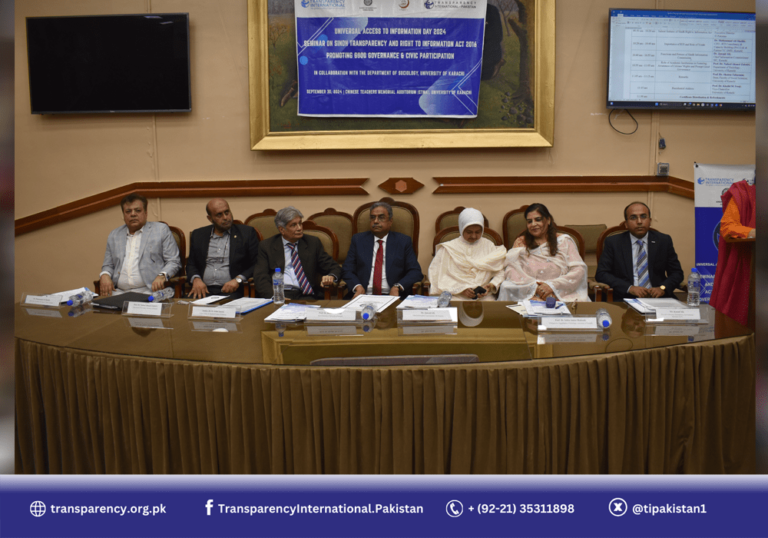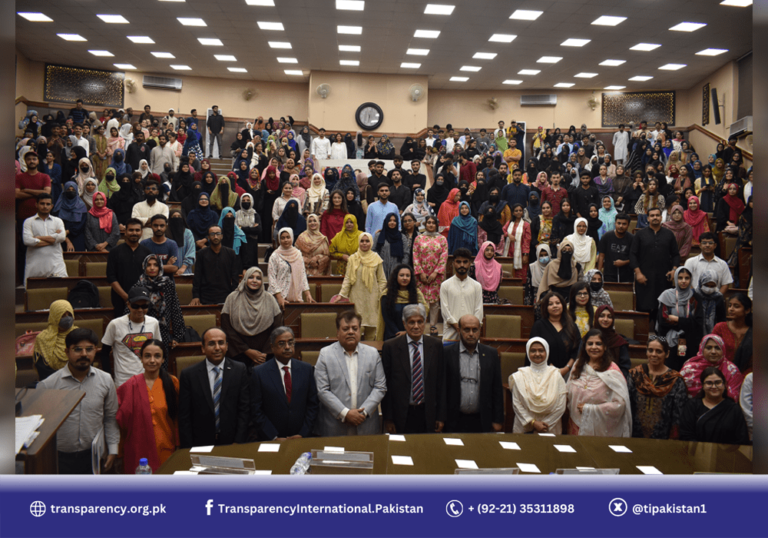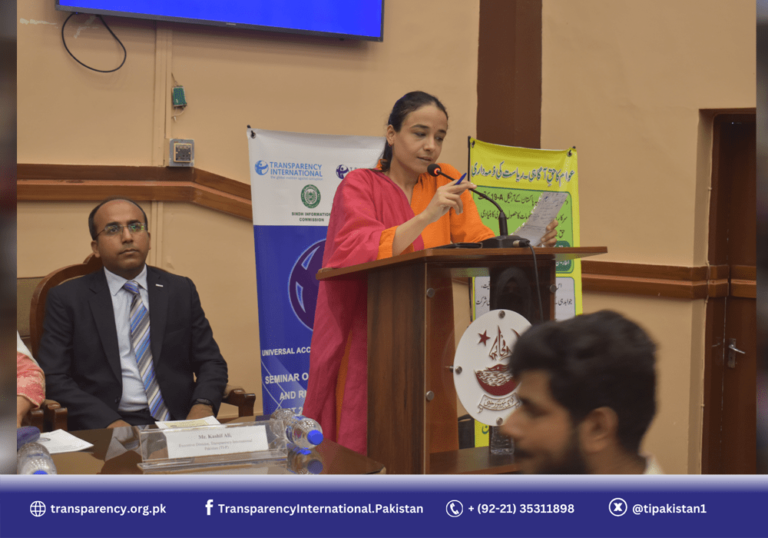Universal Access to Information Day 2024: Seminar on Sindh Transparency and Right to Information Act 2016, Promoting Good Governance & Civic Participation through
Title: of Universal Access to Information Day 2024: Seminar on Sindh Transparency and Right to Information Act 2016, Promoting Good Governance & Civic Participation through
Date: Monday, September 30, 2024
Venue: Chinese Teachers Memorial Auditorium, University of Karachi
On Monday, September 30, 2024, Transparency International Pakistan (TI Pakistan), in collaboration with the University of Karachi and the Sindh Information Commission, held a successful seminar titled “Sindh Transparency and Right to Information Act 2016: Promoting Good Governance & Civic Participation”. This event, part of the International Day for Access to Information celebrations, took place at the Chinese Teachers Memorial Auditorium, University of Karachi. The event fostered dialogue around promoting transparency, good governance, and civic participation, attracting students and faculty from multiple disciplines, including Sociology, Law, and Social Sciences. Over 440 students and faculty members participated in this seminar including 340 female students.
Ms. Sonia Arain, Project Coordinator at TI Pakistan, commenced the session by inviting a student volunteer to lead the recitation of the Holy Quran. This was followed by a warm welcome from Prof. Dr. Sobia Anees Shahzad, Chairperson of the Department of Sociology at the University of Karachi, who in her opening remarks emphasized the importance of empowering citizens through the Right to Information (RTI) to promote accountability and transparent governance.
Moving on, Justice (R) M. Ather Saeed, former Supreme Court Judge and Board Trustee of TI Pakistan, followed with remarks on the constitutional foundation of RTI under Article 19-A. He emphasized the critical need for awareness of RTI to bolster democratic governance and improve public service delivery. He also stressed the crucial role of RTI in strengthening democratic accountability and ensuring transparent, participatory governance. His address emphasized the importance of citizens exercising their right to access information.
Next, Mr. Kashif Ali, Executive Director of TI Pakistan, then elaborated the Salient Features of the Sindh Right to Information Act 2016, outlining how it strengthens transparency mechanisms across provincial departments. He emphasized that increased public access to information empowers citizens to hold institutions accountable and encourages active participation in governance, which empowers citizens to demand transparency from government institutions. He emphasized the act’s role in holding the government accountable and fostering openness across Sindh. He enhanced awareness on different clauses of the RTI Act including informing the students about the definition of public body, procedure of writing RTI request and proactive disclosure provisions.
Afterwards, Dr. Muhammad Ali Shaikh, CEO of RTI Consultancy, highlighted the vital role of youth in using RTI to drive civic engagement and addressed the vital role of youth in advocating for transparency and exercising their right to information. He underscored the potential of students to drive positive change by using RTI as a tool for accountability. He encouraged young people to utilize RTI laws to promote societal change and strengthen democratic processes in Pakistan. He also gave practical examples from the region and global best practices on how RTI is used as a social accountability tool.
Moving on, Dr. Jawaid Ali, Chief Information Commissioner, Sindh Information Commission shed light on the functions and powers of the Sindh Information Commission as the enforcer of RTI laws. He emphasized the Commission’s role in ensuring transparency and empowering citizens through access to information. He provided an overview of the Commission’s mandate and functions, focusing on its pivotal role in ensuring the effective implementation of the RTI Act across the Sindh province.
Next, Prof. Dr. Nabeel Ahmed Zubairi from the University of Karachi highlighted how academic institutions can foster greater awareness of citizens’ rights and actively contribute to good governance. He emphasized the pivotal role academic institutions play in fostering civic awareness and promoting good governance. He called for stronger collaboration between educational institutions and civil society to advocate for transparency.
Towards the end, Prof. Dr. Shaista Tabassum, Dean of the Faculty of Social Sciences, University of Karachi, in her closing remarks emphasized the collective responsibility of academia, government, and civil society in promoting transparency and accountability for the betterment of society. She praised Transparency International Pakistan (TI Pakistan) and Sindh Information Commission collaborative efforts to promote transparency, urging students to be champions of good governance.
The seminar highlighted the importance of transparency in governance and the critical role of RTI in fostering civic participation. The event served as a platform for meaningful discussions on how Pakistan’s improved RTI framework aligns with the nation’s democratic values and paves the way for a more informed and engaged citizenry.
The seminar concluded with a focus on the ongoing need for greater awareness and implementation of RTI laws as both a constitutional right and a tool for empowering citizens. Through collaborative efforts, Pakistan can continue to progress towards a more transparent, open, and participatory democracy. Transparency International Pakistan remains dedicated to raising awareness and ensuring citizens have the tools to seek accountability from public institutions, continuing its mission to build a corruption-free and transparent society.
The seminar concluded with a distribution of shield to speakers for their active participation, followed by a refreshment, marking another milestone in Pakistan’s journey toward transparency and open governance.










